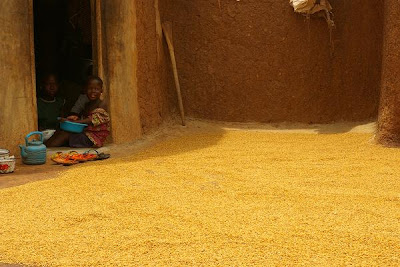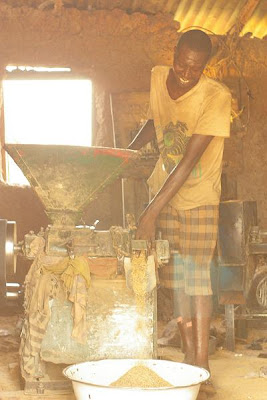I also had my second meeting with the NILRIFACU rice producer and processor cooperative. The cooperative has a marketing fund and the idea is that they buy rice from producers at harvest time and resell it to processors when prices are high. Sarah Grant (my coach and a long-term volunteer with EWB) and I co-facilitated a needs assessment and visioning session with the cooperative. It consisted of plenty of flipchart paper (which it seems is a standard EWB practice both in Canada and overseas) and a number of question aimed at trying to help the cooperative figure out what their priorities are for the future as well as attempt to start scoping out where I may be able to help them over the next few months. I wouldn’t call it a resounding success, but it could have gone worse.

Some of the NILRIFACU executive standing with me outside their office in Tamale.
Some of NILRIFACU’s chief priorities are to obtain financial compensation for the cooperative’s executive (a reasonable request since they are volunteers who also have their own farms to manage), transportation for the executive, their own grinding mill and more reliable tractor services for their members. Unfortunately all of these objectives require a source of funding. The cooperative was essentially established by the French development agency and has had a lot of donor support in the past, so they often become stuck on the idea that they need someone to give them more money. And who can really blame them in the NGO saturated world of Ghana where it is often more profitable to learn how to say the right things to the right people than it is to run a legitimate business. We did however manage to discover a couple profit making ideas that the cooperative has been interested in pursuing. These include purchasing inputs (fertilizer, pesticide, etc.) in bulk and reselling to members, better management of the marketing fund to maximize profits from rice sales and the development of the cooperative’s own brand of “high quality assurance” rice. My role in all this has largely yet to be determined, but I will begin by attending the cooperatives meetings and taking part in their work (going to the bank, etc.) as well as teaching several members how to use their newly acquired computer. I’m meeting with the cooperative again today.
The other part of my work with rice has been concerning NERICA (New Rice for Africa). NERICA represents roughly 3000 different varieties of rice created by crossing high-yielding Asian rice with hardy African rice. In addition to being drought resistant, NERICA has a reduced growing season and can produce increased yields of up to 250%. Since its release in the late 1990s, NERICA has attracted a lot of attention. In 2004, its creator, Dr. Monty Jones, became the first African to win the World Food Prize. In an article for Time Magazine, Jeffrey Sachs (economist and author of The End of Poverty) described NERICA as part of an “African Green Revolution”.
NERICA has been widely adopted throughout West Africa and is quickly making its way to the rest of the continent. In my area of Ghana, the Ministry of Food and Agriculture is heavily promoting the production of NERICA. The nearby Savannah Agricultural Research Institute is also conducting a seed growing program in which producers are essentially contract farmers. They are given seed and fertilizer at the start of the growing season and then sell their crop back to the Savannah Agricultural Research Institute, but with the costs of the inputs deducted. As a bit of a side note, I was reading a little about contract farming. Although this is an example of government sponsored contract farming, it seems to be working well. Is there potential for more private sector contract farming? Maybe someone feels like doing some research for me?
Back to NERICA, EWB is asking the question of whether the new rice is everything its cracked up to be. While there are clearly potential benefits, what risks are associated with the new technology? Are there areas the Ministry of Food and Agriculture needs to address as they continue to promote NERICA? This is where I come in.
I’ve had the opportunity to accompany two sociology researchers from Pennsylvania State University who were here for two weeks as part of a larger study on the social impacts of the new technology. It was a great opportunity to get out of Tolon, see some of the smaller villages in the area and get to talk to a few rice farmers.

David (top) and Leland (in car) are sociologists researching NERICA.

Leland, their interpreter Ester and one of the agricultural extension agents.

Some of the farmers we interviewed in their village.
The Americans had a fairly structured interview to conduct, but I feel like I learned a significant amount about rice cultivation and NERICA. Some of my observations thus far:
When Sarah Grant had suggested this project, she had been working under the assumption that NERICA would be replacing other upland crops such as maize. Of the nineteen farmers I’ve talked to, only one has admitted to reducing their maize production. The vast majority seem to be either planting the rice on previously uncultivated lands or else either fully or partially replacing their traditional rice with NERICA.
Growing NERICA is extremely labour intensive. Whereas traditional rice is broadcasted (seeds are thrown), farmers are being taught to plant NERICA in carefully measured rows and make holes with a specified number of seeds in each one. Many have indicated that they now spend more time in their fields because of NERICA and that they often hire labour to assist them (although this wasn’t uncommon before). This raises some interesting questions: If people are spending more time in their fields, is this taking away from other activities? Hiring labour has local economic benefits, but it increases risk for the farmer if his/her yields do not reflect the increased investment. As another interesting side note, some farmers are employing some of the NERICA growing techniques on their traditional rice varieties as well.
Probably the biggest concern raised by NERICA is its heavy dependence on fertilizer. Not using fertilizer reduces yields from about twenty 50kg bags per acre to roughly five. Almost all farmers said that while both NERICA and traditional rice varieties do poorly without fertilizer, the traditional variety does better and that they would not grow NERICA if they could not obtain fertilizer. While seed growers are being given fertilizer by the Savannah Agricultural Research Institute’s seed program (which is scheduled to end in the next year or so), those growing grain are forced to buy their own fertilizer. Although almost all reported using at least some fertilizer, many said they had to take loans to obtain it and that they were not able to use as much as recommended. Taking loans has obvious risks if external factors (drought, animal destruction) impact yields and the farmer cannot sell his crop to pay back the loan. Also, the increasing price of oil is already impacting the price of chemical fertilizer, which has almost doubled in the last year. The government has recently announced it will increase fertilizer subsidies, but this solution is a limited one at best. What are the long-term implications for NERICA growers if oil (and fertilizer) prices continue to rise?
Interestingly, few are actually consuming the NERICA. Most are either selling to the Savannah Agricultural Research Institute or to large buyers coordinated by the Ministry of Food and Agriculture. Those who said they have tried eating it actually prefer the taste to traditional rice.
While not everyone we talked to had been all that successful with growing NERICA (either due to late planting, drought, destruction by cattle or lack of fertilizer), almost all indicated that they liked NERICA and that they would continue to grow it. I have a hunch part of this apparent satisfaction is due to the perception that the new fancy technical solution is always the best, but one cannot deny the potential benefits NERICA has for the individual farmer.
I feel like the next phase of this project is going to be to get some harder numbers on the relative cost of inputs, yields and market prices between traditional rice and NERICA. Hopefully I'll be able to do some sort of sensitivity analysis to compare the relative profitabilities of the two varieties if fertilizer prices continue to rise. It would also be nice to look at other crops, but a direct comparison might be difficult. The next few weeks are probably going to involve talking to the some more farmers, staff at the Ministry of Food and Agriculture office where I work and NERICA experts at the Savannah Agricultural Research Institute. I also need to keep in my the challenge of making sure this doesn't become just a nice report that a few people read, but that doesn't result in any real action on the ground.
How is rice processed??

After rice is harvested it must be parboiled to soften the husk for milling.

Once parboiling is complete, the rice is dried. This is typically done on the floor of the processor's compound.

More rice drying...

Finally rice is milled to remove the husk. Ideally this process would be fallowed by a de-stoner (to remove stones, other foreign matter) and a colour sorter (to remove the brown particles). Unfortunately this rarely happens in Ghana and local rice is often of inferior quality. Those who can afford it typically purchase imported rice.



3 comments:
love that shirt you're rocking in the first pic buddy. you're doing some great stuff sam, i hope you know that.
Hey Sam! I'm loving the posts and the photos.. and the work you're doing sounds so amazing. The issues are so complex and this post in particular really illustrates that reality. Thanks for sharing and educating with your first-hand experience.. its definitely eye-opening. Keep up the awesome work and stay healthy.
hey Sam, sorry about that first phone call's unsuccessfulness and for cutting out in the 2nd phone call. i only had 1$ and I guess the rates to Ghana are higher than I expected so I thought we had a decent 2 minutes left when it just cut out. I'll try to get a credit card # so I can recharge the Skype! How often do you go on the internet? I can definitely respond to you quickly that way.
Post a Comment